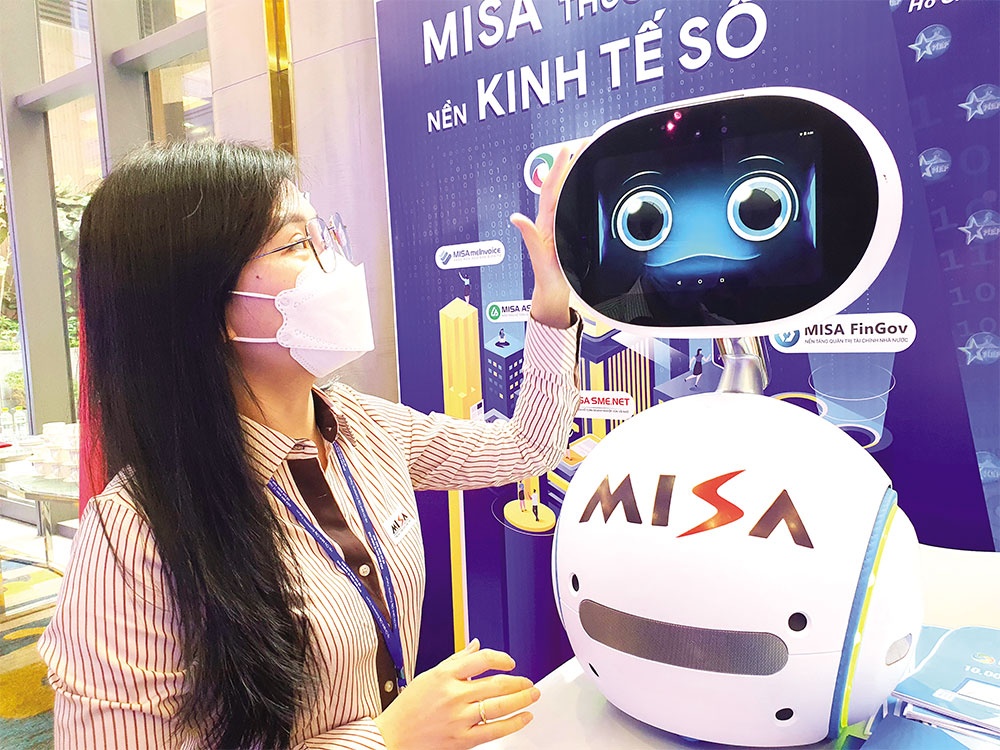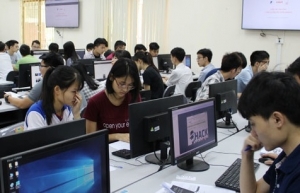Educators become more STEM-aware
At a seminar on training high-quality human resources (HR) in science, technology, engineering, and mathematics (STEM) at the Hanoi University of Science and Technology on November 8, experts agreed that specialised HR in professions related to STEM would determine the prosperity of the nation. However, this type of education is currently a blind spot in elementary through to high schools, with most of the focus being on university education.
 |
| The social restrictions since 2020 have catapulted new ideas for teaching, photo Le Toan |
According to Le Huy Hoang, deputy director of the Department of Education and Training, Central Propaganda and Training Commission, while the goal of developing STEM capabilities has been set, joined-up solutions have yet to be developed.
“General education plays a significant role in guiding careers. However, the percentage of students who choose natural science for their high school graduation exam is always low,” Hoang said. “While public schools have been interested in promoting STEM education, the objective of developing competencies and guiding students to tech-related careers is unachieved.”
Assoc. Prof. Huynh Quyet Thang of Hanoi University of Science and Technology cited international lessons from the US and Europe, where training for maths and technology-oriented students is well-organised from the early stage. “This allows them to form the ability to think creatively and form basic competencies so when they enter university, they develop the ability to innovate and adapt to solve bigger problems,” Thang said.
Drawing on international experience has been a popular approach for most STEM-aware educational institutions, as domestically developed curriculums are still finding their place. While STEM-focused curriculum has only been present in Vietnam in the past few years, more mature and well-tested programmes have been developed in the US since the 90s, in Australia since 2009 with the iSTEM programme, and in China since 2013.
“International cooperation in STEM education is the right move currently to save time and increase efficiency, since our own development can’t be achieved overnight,” said Prof. Ngo Bao Chau. “While mathematicians can generally agree on a basic educational idea, building detailed programmes and curriculums takes time and a lot of research, and that’s where adopting international knowledge can be helpful.”
The STEM Innovation Camp 2022 involves cooperation from 2021 to 2025 between the Department of Secondary Education, the Ministry of Education and Training (MoET), and the Kenan Foundation Asia, sponsored by Boeing. This event has been implemented at 28 secondary schools in Hanoi, aiming to create an environment where students can participate in scientific activities while improving soft skills and a love for science and technology.
The project focuses on building core teaching staff in developing STEM lesson plans under the guidance of international experts from the US, Japan, and Thailand.
Similarly, Education New Zealand (ENZ), a government agency for international education, recently signed a partnership with The Mind Lab, where ENZ sponsored 30 full scholarships for Vietnamese educators to join in digital and collaborative teaching and learning micro-credential courses.
Elsewhere, the private education sector is asserting its role in partnership formation with international organisations and infrastructure investment. Minh Viet Academy recently became the first online school to offer advanced maths programmes delivered in English through a partnership with AoPS. It is the largest after-school advanced maths programme in the United States, with over 750,000 alumni and an online community of over three million. Through the AoPS curriculum, the school allows students in Vietnam to access a wide range of customised lessons based on their individual abilities.
In Ho Chi Minh City, the online teaching model integrated is being applied at several schools through a collaboration with EMG Education. The group has become the first in Vietnam to apply virtual technology in teaching.
“New teaching methods require that we are not constrained by the physical limitations of the traditional classroom,” said academic director James Moran.
| According to a report by the Department of International Cooperation under the Ministry of Education and Training, by the end of June 2022, Vietnam had attracted over 600 international projects in education, with a total investment of more than $4.57 billion from 33 countries and territories. At the university level, the country has more than 400 joint training programmes with foreign countries, of which 186 are licensed by autonomous higher education institutions and 222 by the MoET. At the top of the list in terms of joint projects with Vietnam are the United Kingdom (101 programmes), the United States (59), France (53), Australia (37), and South Korea (27). |
 | Education institutions ramp up digital infrastructure The race amongst Vietnamese universities to go digital is expected to accelerate, with schools boasting more digital components predicted to gain the upper hand in both teaching quality and admissions. |
What the stars mean:
★ Poor ★ ★ Promising ★★★ Good ★★★★ Very good ★★★★★ Exceptional
Themes: Digital Transformation
- Dassault Systèmes and Nvidia to build platform powering virtual twins
- Sci-tech sector sees January revenue growth of 23 per cent
- Advanced semiconductor testing and packaging plant to become operational in 2027
- BIM and ISO 19650 seen as key to improving project efficiency
- Viettel starts construction of semiconductor chip production plant
Related Contents
Latest News
More News
- A golden time to shine within ASEAN (February 19, 2026 | 20:22)
- Vietnam’s pivotal year for advancing sustainability (February 19, 2026 | 08:44)
- Strengthening the core role of industry and trade (February 19, 2026 | 08:35)
- Future orientations for healthcare improvements (February 19, 2026 | 08:29)
- Infrastructure orientations suitable for a new chapter (February 19, 2026 | 08:15)
- Innovation breakthroughs that can elevate the nation (February 19, 2026 | 08:08)
- ABB Robotics hosts SOMA Value Provider Conference in Vietnam (February 19, 2026 | 08:00)
- Entire financial sector steps firmly into a new spring (February 17, 2026 | 13:40)
- Digital security fundamental for better and faster decision-making (February 13, 2026 | 10:50)
- Aircraft makers urge out-the-box thinking (February 13, 2026 | 10:39)

 Tag:
Tag:


















 Mobile Version
Mobile Version